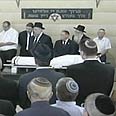
While none of us meticulously plan for our deaths, the majority of the Israeli public knows exactly how they would like to be buried, and just who would conduct the funeral. A joint poll conducted by Ynet and the Gesher foundation, found that 62% of Israelis would like to be buried in a religious ceremony, and, moreover, 51% of Israelis believe that the traditional Jewish funeral should not be altered.
Tradition, however, is quickly set aside for IDF soldiers. Most Israelis staunchly maintain that non-Jewish soldiers must be buried in ordinary cemetery plots just like their Jewish fellows. And just who would we like to conduct the funeral? On this, opinions differ. Secular Jews would like a family member to preside over their funeral, whereas religious Jews seem to favor the Chevra Kadisha.
When asked “How would you like your relatives or family members to be buried?” 62% of Israelis mentioned a traditional Jewish funeral; whereas 17% opted for a secular burial. Only four percent of respondent opted for the more controversial option of cremation, a notion that has recently enraged the hardei community. The remainder of the sample refused an answer.
Tradition or change?
Most Israelis do not want to “upgrade” or alter the traditional Jewish funeral, and remain loyal to tradition. Fifty-one percent of Israelis describe the traditional Jewish funeral as “unique”, and feel that it should not be changed. Other segments of the Israeli population would like to “update” the Jewish funeral service…. somewhat.
Eighteen percent of respondents preferred burial in a coffin to a stretcher, and an additional 6% recommended adding more “modern” reading to the traditional prayers and psalms.
In death, even secular Jews appear to remain loyal to tradition. Forty three percent of secular Jews see no need to alter the traditional service, and an additional 9% would simply like to add additional readings and poems to the more time-honored prayers.
Israelis, moreover, seem to have special reverence for IDF soldiers. There is still a great deal of controversy as to where non-Jewish IDF soldiers ought to buried, to which most Israelis replied - right alongside their Jewish peers.
Sixty-two percent of Israelis stated that the army must bury non-Jewish soldiers in ordinary cemetery plots. Nine percent of respondents feel non-Jewish soldiers ought to be buried in secular cemetery plots, and seven percent stated that such solders ought to be buried on the outskirts of Jewish cemeteries. It is important to note that the IDF buries non-Jewish casualties in special sub-plots within military cemeteries, without any special partitions.
Who would Israelis like to preside over their funerals? On this issue, too, Israelis appear to be mostly in keeping with tradition. Thirty-six percent of Israelis would like to leave this task to the traditional Chevra Kadisha. Twenty-two percent of Israelis would like to designate this task to a close family member or friend; whereas an additional 19% would like to train Rabbis to help grieving families connect with a sense of Jewish identity and tradition. Whereas secular Jews would prefer to be buried by a family member of friend (34%), religious Jews, not surprisingly, would leave this task to the Chevra Kadisha.
So what do all of these facts and figures actually mean? Shoshi Becker, head of Gesher educational enterprises, suggests that the ultra-Orthodox rabbinic world combine the traditional Jewish funeral service with other, alternate approaches for the more secular public, and allow a more “personalized” approach to burial.
She notes that in Israel today even those seeking a secular burial can have a solemn and dignified service. As pertains to non-Jewish IDF soldiers Beker notes: “The Israeli public recognizes the vital public and national role that IDF soldiers play, and therefore would like to see all soldiers buried in special military plots.”
This poll, conducted by the Mutagin center, was based upon a representative sample of 500 adult, Hebrew speaking Jewish Israelis.















